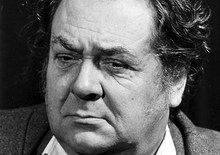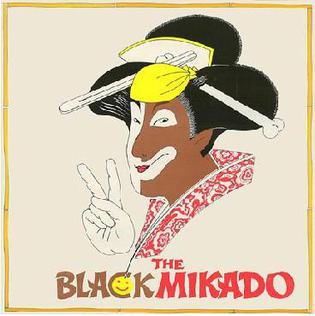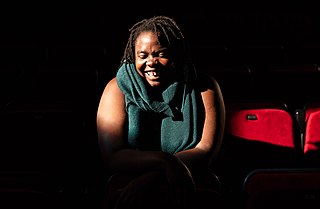Related Research Articles

Jeffrey Addison Nuttall was an English poet, performer, author, actor, teacher, painter, sculptor, jazz musician, anarchist and social commentator who was a key part of the British 1960s counter-culture. He was the brother of literary critic A. D. Nuttall.

Michael Figgis is an English film director, screenwriter, and composer. He was nominated for two Academy Awards for his work on Leaving Las Vegas (1995). Figgis was the founding patron of the independent filmmakers' online community Shooting People.

The D'Oyly Carte Opera Company is a professional British light opera company that, from the 1870s until 1982, staged Gilbert and Sullivan's Savoy operas nearly year-round in the UK and sometimes toured in Europe, North America and elsewhere. The company was revived for short seasons and tours from 1988 to 2003, and since 2013 it has co-produced four of the operas with Scottish Opera.
DV8 Physical Theatre was a physical theatre company based at Artsadmin in London, United Kingdom. It was officially founded in 1986 by Lloyd Newson (1986–2015), Michelle Richecoeur (1986–1988) and Nigel Charnock. Lloyd Newson led the company as choreographer and artistic director from its inception, apart from the production My Sex, Our Dance (1986), which was co-created and performed with Nigel Charnock. DV8 officially ended in April 2022 when Lloyd Newson announced his retirement via the company web page.

The King's Head Theatre, founded in 1970 by Dan Crawford, is an off-West End venue in London. It is the oldest operating pub theatre in the UK. In 2021, Mark Ravenhill became Artistic Director and the theatre focusses on producing LGBTQ+ work, work that is joyful, irreverent, colourful and queer.
John Mackenzie Calder was a Scottish-Canadian writer and publisher who founded the company Calder Publishing in 1949.
Station House Opera is a British performance art and theatre company. It was founded in 1980 by Julian Maynard Smith, who is still artistic director. Station House Opera had a long working relationship with Stichting Mickery Workshop in Amsterdam, Netherlands.
Zoë Mendelson is a Glasgow-based British artist.

The Pip Simmons Theatre Group was formed in 1968. Pip Simmons, the founder, served both as writer and director, but he was open to the ideas of others in the company, much of their work being devised pieces. Initially London based, it was one of the first English experimental theatre companies but spent much of its time working in Europe where there was a more sympathetic financial and institutional network. Simmons maintained the momentum of the group by taking a series of 'residencies' in theatre spaces around the UK and Europe, which was not a familiar concept at the time. The group performed at the Mickery Theatre, under the nurturing gaze of Ritsaert ten Cate, along with contemporaries such as Mike Figgis, and The Wooster Group. Pip Simmons has said of Ritsaert: 'Ritsaert made it possible for us to experiment. He was learning with us, and he didn't hide it...I did my best work there in Holland, and Ritsaert stimulated it. His stimulation wasn't just for one short period, though. He provided the best stimulation, because he stuck with you through failures as well as successes. He can't be compared with anyone else in Europe.'

The Black Mikado is a musical comedy, based on Gilbert and Sullivan's The Mikado, adapted by Janos Bajtala, George Larnyoh and Eddie Quansah from W. S. Gilbert's original 1885 libretto and Arthur Sullivan's score. The show premiered on 24 April 1975 at the Cambridge Theatre in London, where it ran for 472 performances before going on a national tour. A 1976 production was mounted in Soweto, South Africa, where it played at the Diepkloof Hall. After this, the musical was not revived.
David Weston is an English actor, director and author. Since graduating from the Royal Academy of Dramatic Art (RADA) in 1961 he has acted in numerous film, television and stage productions, including twenty-seven Shakespeare plays and prominent guest roles in two Doctor Who serials. With Michael Croft, he was a founder member of the National Youth Theatre. Much of his directing work has been for that organisation; he has directed also at the Regent's Park Open Air Theatre and a number of other theatres in London. He wrote and narrated a series of non-fiction audio books, including Shakespeare His Life and Work, which won the 2001 Benjamin Franklin Award for best audio non-fiction book.
Ernest Lotinga was a British comedian and film actor. Lotinga became known for the Josser character whom he portrayed in a series of comedy films during the 1930s.
The Almost Free Theatre was an alternative and fringe theatre set up by American actor and social activist E. D. Berman in 1971 in Rupert Street, Soho, London.

Lois Weaver is a Guggenheim-winning American artist, activist, writer, director, and Professor of Contemporary Performance at Queen Mary University of London. She is currently a Wellcome Trust Fellow in Engaging Science.
Monstrous Regiment Theatre Company is a British feminist theatre company established in 1975. Monstrous Regiment went on to produce and perform 30 major shows, in which the main focus was on women's lives and experiences. Performer-led and collectively organised, its work figures prominently in studies of feminist theatre in Britain during the 1970s and 1980s. No productions have been mounted since 1993, when financial support from the Arts Council of Great Britain was discontinued.
Welfare State International was a British experimental theatre group formed in 1968 by John Fox and Sue Gill, Roger Coleman and others. It became "A collective of radical artists and thinkers who explored ideas of celebratory art and spectacle between 1968 and 2006."
Rachel Gadsden is a UK-based visual artist and performance artist who is exhibited internationally and who works across the mainstream and disability art sectors. Gadsden has led a range of national and international participative programmes exploring themes of fragility and resilience. She has had a lung condition all her life and is injected by a syringe driver at one-minute intervals with the medication she needs to keep her alive.
Rosana Cade is a Glasgow-based live performance artist. They are known mainly for their queer, feminist and activist approaches to work. They are notable for winning the Edinburgh Festival Fringe Awards 2016, for Physical/Visual Theatre with Cock and Bull, and has toured work to The National Theatre, Battersea Arts Centre and international venues including Teatro Maria Matos, Lisbon, Frascati, Amsterdam and Kwai Fong Theatre, Hong Kong.
Nic Green is a performance maker and activist, brought up in Yorkshire, but based in Glasgow. Her work is based on the environment, social responsibility and relationships. She is well known for her use of nudity on stage, for example Trilogy (2009–2010), which is a two-hour show in three parts. It is a feminist, political statement on the body where she, three other women and a man are naked for the duration of it as well as asking members of the audience to take their clothes off too.

Selina Thompson is a performance artist based in the United Kingdom. Her work is focused on the way that identity shapes our lives and intersects with politics, the environment and topics such as freedom. Her work has been shown at Spill, Fierce, Mayfest, the Birmingham REP and the West Yorkshire Playhouse. She has created work for hairdressers, toilets, galleries, pubs and theatres. Thompson is the artistic director of Selina Thompson Ltd, an interdisciplinary company creating installations, theatre shows, workshops and radio work, where she works alongside Sarah Cruickshank, Toni-Dee Paul and other collaborators.
References
- ↑ Jeff Nuttall Performance Art Memoirs. Volume 1 (John Calder,1979)
- ↑ Kershaw, Baz (1992). "The carnival of performance art". The Politics of Performance: Radical Theatre as Cultural Intervention. Routledge. p. 69. ISBN 0-415-05763-9 . Retrieved 20 November 2008.
- ↑ Mark Long interviewed by Susan Croft of Unfinished Histories, 30 October 2014 https://www.unfinishedhistories.com/interviews/interviewees-l-q/mark-long/
- ↑ Barry Miles London Calling - a countercultural history of London since 1945 Atlantic Books, 2010 page 234
- ↑ Malcolm Hay 'Showcasing the Fringe' inDreams and Deconstructions – Alternative Theatre in Britain Sandy Craig, editor (Amber Lane Press,1980)
- ↑ Mark Long interviewed by Susan Croft of Unfinished Histories, 30 October 2014
- ↑ Kershaw, Baz (2004). "Alternative theatres, 1946-2000". The Cambridge History of British Theatre. Cambridge University Press. p. 361. ISBN 0-521-65132-8 . Retrieved 20 November 2008.
- ↑ For a full listing of venues see https://www.unfinishedhistories.com/history/companies/people-show/
- ↑ "La Mama Archive".
- ↑ "PS 129: The Jossers".